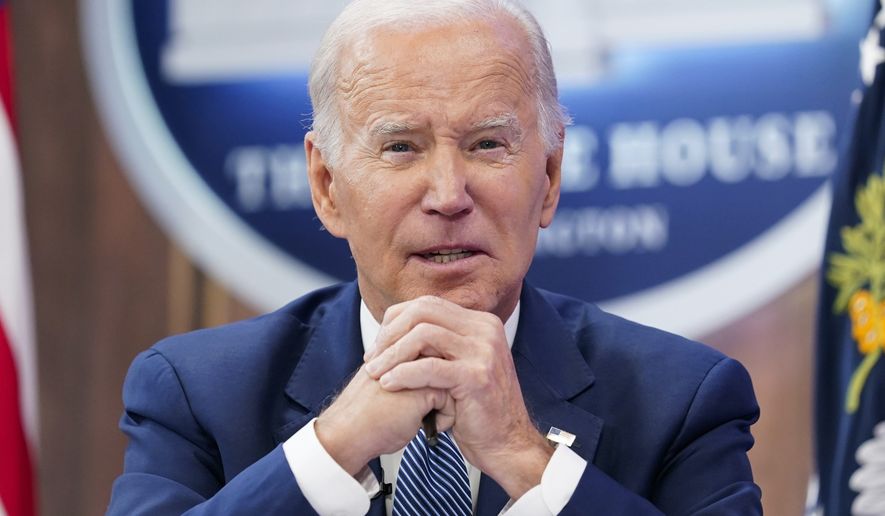President Biden has ordered a reevaluation of the longstanding U.S. relationship with Saudi Arabia as Democrats fume over OPEC’s decision to cut production, the White House said on Tuesday.
The White House and private market analysts say the Saudi-led cuts — equal to 2 million barrels per day — bolster Moscow as Russian President Vladimir Putin desperately seeks the revenues to finance his war in Ukraine. The effect of the production cut by the so-called “OPEC+” group will mean better prices for Russian gas exports and new upward pressure on the politically sensitive price Americans pay for a gallon of gas.
OPEC’s decision also flew in the face of Mr. Biden’s thinly veiled public pleas and private lobbying to Saudi Arabia to at least maintain global oil production quotas as gas prices peaked over the summer.
National Security Council spokesman John Kirby said the president questions whether the country’s relationship with the oil-rich kingdom is “where it needs to be” and whether it is “serving our national security interests.”
“He does believe that this is a good time to reevaluate and see what that relationship ought to look like going forward,” Mr. Kirby told reporters. “It was an OPEC+ cartel decision, but clearly Saudi Arabia is the leader of that cartel.”
The White House comments came a day after Senate Foreign Relations Committee Chairman Robert Menendez sharply criticized Saudi Arabia for the production cut and pledged to block “any cooperation with Riyadh until the kingdom reassesses its position” saying the production cut was a gift to Mr. Putin.
“There simply is no room to play both sides of this conflict — either you support the rest of the free world in trying to stop a war criminal from violently wiping off an entire country off of the map, or you support him,” the New Jersey Democrat said. “The Kingdom of Saudi Arabia chose the latter in a terrible decision driven by economic self-interest.”
He added, “The United States must immediately freeze all aspects of our cooperation with Saudi Arabia, including any arms sales and security cooperation beyond what is absolutely necessary to defend U.S. personnel and interests.”
As the White House was announcing the review Tuesday, Sen. Richard Blumenthal, Connecticut Democrat, and Rep. Ro Khanna, California Democrat, introduced a bill that would immediately pause all U.S. arms sales to Saudi Arabia for one year. This pause would also halt sales of spare and repair parts, support services and logistical support, The Associated Press reported.
U.S. relations with Riyadh have long been a mix of cooperation and tension. Relations were strained with Jamal Khashoggi’s death in 2018. A Saudi government hit team killed the U.S.-based dissent journalist in Turkey.
Mr. Kirby said on Tuesday that the president did not consult with Mr. Menendez or any lawmakers before calling for a review of the relationship, but said he remains “willing to discuss” the review with members of Congress.
“He knows that many members have expressed concerns on both sides of the aisle about where we stand now with the OPEC cartel and Saudi Arabia,” Mr. Kirby said. “He’s willing to have that discussion.”
Mr. Biden faced a strong backlash for his July visit to Saudi Arabia for fist-bumping Crown Prince Mohammed bin Salman, who U.S. intelligence concluded had directed the Khashoggi operation. While Mr. Biden was running for office in 2020, he promised to make Saudi Arabia a “pariah.”
But the president was willing to withstand the criticism to increase the supply of oil, pushing Saudi Arabia to increase its output by about 750,000 barrels per day as the Ukraine war and sanctions on Russia roiled the markets.
At the time of the visit, the average price of gas in the U.S. was $4.52 per gallon, according to AAA. Prices at the pump have fallen steadily over recent months after hitting a record-high average of $5.01 per gallon in June.
But OPEC’s announcement stands to chip away at Mr. Biden’s goodwill among voters.
The president defended the trip last week following OPEC’s announcement, telling reporters that the visit “was not essentially about oil.”
White House press secretary Karine Jean-Pierre said Tuesday that the president has yet to appoint an official to lead what she said would be a thorough review, offering few details on what policies might change.
Saudi Arabia has been a key customer of U.S. arms sales. To date, the administration has notified Congress of more $4 billion in arms to Saudi Arabia, according to the Washington-based Forum on the Arms Trade, and in August, the administration offered details of a potential sale of more than $3 billion in new arms for Riyadh, including 300 Patriot missiles.
Lawmakers from both parties have raised concerns about the relationship well before the latest dust-up. In June, a bipartisan group of House lawmakers offered a resolution that would end U.S. logistical support to the Saudi-led coalition that has intervened in Yemen’s civil war to battle the Iran-backed Houthis. A similar measure has been introduced in the Senate.
• Joseph Clark can be reached at jclark@washingtontimes.com.




Please read our comment policy before commenting.